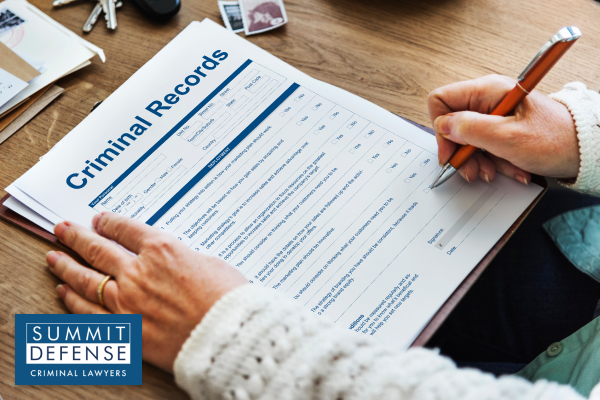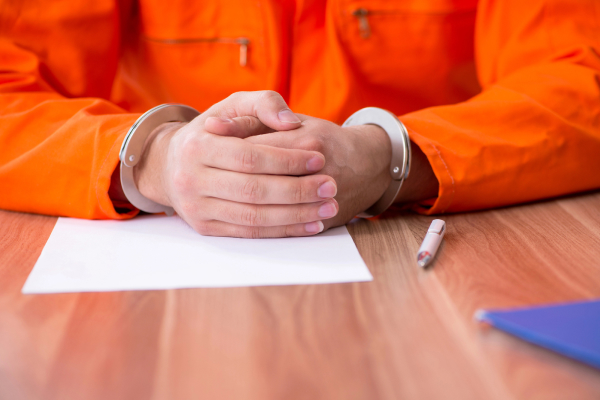What Are Collateral Consequences?
Collateral consequences are extra penalties that come after a criminal conviction. They aren't part of what the judge orders in court. Unlike prison sentences, fines, or community service, no one talks about these during your sentencing. But they can still change your life in big ways.
These hidden penalties surprise most people who plead guilty to criminal charges. Even worse, some problems begin before you're found guilty. Just getting arrested can trigger background checks that hurt your job chances.
Experts call this "civil death" - when people with criminal records get pushed out of normal life. The National Inventory of Collateral Consequences lists over 40,000 such penalties across the country. Before you make any choices about your case, you need to know what you're really facing beyond just jail time or fines.
Employment Consequences of a Criminal Record
 Finding work with a criminal record is one of the hardest parts of life after conviction. Most states let employers ask about criminal histories when you apply for jobs. This creates big roadblocks for people convicted of crimes.
Finding work with a criminal record is one of the hardest parts of life after conviction. Most states let employers ask about criminal histories when you apply for jobs. This creates big roadblocks for people convicted of crimes.
Background screening has become very common. More than half of all employers use background checks, and many reject people with criminal records without looking at their skills. This makes it extra hard to find a job.
- Almost 75% of formerly incarcerated people don't have jobs a year after release
- A conviction record can show up on background checks for 7-10 years
- People with felony convictions earn 40% less than those without criminal records
For many jobs, licensing rules block entry completely. A felony conviction can stop you from working in healthcare, teaching, or government. A DUI can cost you your driver's license. Drug crimes might keep you out of pharmacy jobs. These job barriers lead many formerly incarcerated people back to prison simply because they can't find legal work.
In Harris County and across the country, licensing boards can deny licenses based on criminal convictions from decades ago. This makes it even harder for people with criminal histories to find good jobs.
Housing and Financial Impacts
Finding a place to live with a criminal record is very hard. This problem is just the first of many money troubles that people convicted of crimes face after release. Studies show that formerly incarcerated people are almost 10 times more likely to be homeless than others.
Denial of Public Housing and Rental Applications
Federal law lets public housing authorities reject people with certain criminal backgrounds. This is especially true for certain drug crimes, which can lead to lifetime bans from public housing. In many states, whole families can lose their homes if one family member is convicted of a crime that happened nearby.
Private landlords also check for criminal records. They often reject anyone with a felony conviction, no matter how old the offense is. This forces many people with conviction records into unsafe housing or homelessness. The barriers are so high that many people convicted of crimes live with family members for years after release, which strains those relationships.
Loss of Government Benefits
A prior criminal conviction, especially for certain drug crimes, can stop you from getting welfare benefits. This includes the Supplemental Nutrition Assistance Program (SNAP) or help for needy families. The 1996 welfare reform law created a lifetime ban on these benefits for people convicted of drug felonies. Some states have changed this rule, but many still block these benefits.
When parents can't get food stamps or cash help, their children suffer too. These benefit limits push families deeper into poverty, making it even harder to build stability after prison.
Difficulty Getting Loans or Keeping a Driver's License
Your conviction record follows you when you try to get loans. Banks may charge higher interest rates or turn you down when you apply for home loans, car loans, or business loans. Insurance companies may charge more for people with criminal records.
Many states also take away driver's licenses for unpaid court fines. This creates a trap—you need to drive to work to pay your fines, but you can't legally drive until the fines are paid. These financial barriers keep people in debt for years after serving their sentence.
Civil Rights Restrictions
 A criminal conviction can take away basic rights that other citizens have. These limits often last much longer than any prison sentence, creating punishment that continues for years or even a lifetime.
A criminal conviction can take away basic rights that other citizens have. These limits often last much longer than any prison sentence, creating punishment that continues for years or even a lifetime.
Voting Rights and Felony Disenfranchisement
In California, you can vote after finishing your prison sentence. But in many states, felony disenfranchisement laws stop people with felony convictions from voting. This affects millions of Americans.
- 5.2 million Americans can't vote because of felony convictions
- Black people lose voting rights at rates much higher than other groups
- Only two states (Maine and Vermont) let all people with criminal records vote
In some states, so many people have lost their right to vote through mass incarceration that election results are affected. This creates communities where large groups of residents have no political voice.
Jury Service Eligibility
Most states don't allow people with felony convictions to serve on juries. This means that juries rarely include anyone who understands the criminal justice system firsthand. It affects the Sixth Amendment right to a jury of your peers and takes away important viewpoints from the courts.
Firearm Ownership Restrictions
Federal law bans gun ownership for anyone convicted of a felony. This ban applies in all states, with very few ways to get this right back. Even some misdemeanors—like domestic violence offenses—can trigger lifetime gun bans. These limits apply whether or not your original crime involved weapons.
Family and Immigration Consequences
A criminal conviction doesn't just affect you. It can hurt your family relationships and immigration status, too. These consequences can split up families through rules that aren't explained during the court process.
Child Custody and Visitation Challenges
Family courts often view criminal convictions as a big problem in custody decisions. A criminal record—especially for violent crimes or drug crimes—can lead to limited visits or complete loss of custody. Parents with criminal records may face supervised visits that make normal parent-child relationships hard.
Family separation caused by prison time has lasting effects on children. Research shows that having a parent in prison increases a child's risk of depression, anxiety, and behavior problems. More than 5 million American children have had a parent in prison at some point.
Deportation Risks for Non-Citizens
For non-citizens, criminal charges carry very high risks. Even minor offenses can lead to deportation under immigration law. Many immigrants plead guilty without understanding these consequences, only to face removal years later, even after serving their sentence.
Judges and defense attorneys don't always have to explain immigration consequences before someone pleads guilty. This has led to thousands of deportations based on old convictions where the person had no idea their plea could get them deported.
Foster Care and Adoption Restrictions
Criminal histories can stop you from fostering or adopting children. Background checks in this area are very strict, with certain offenses creating automatic rejection no matter how long ago they happened.
These limits affect not just individuals but whole families. Grandparents with old convictions may be unable to take custody of grandchildren when parents can't care for them. This pushes more children into the foster care system instead of allowing them to stay with family.
Education and Student Aid Barriers
 Education offers a path out of the criminal justice system, but collateral consequences often block this route for those with criminal convictions.
Education offers a path out of the criminal justice system, but collateral consequences often block this route for those with criminal convictions.
Many colleges still ask about criminal histories on their forms. Schools use this information to deny admission to qualified applicants. Studies show that nearly two-thirds of people with criminal records who start college applications never finish them. They often get discouraged by questions about their criminal history.
Drug convictions can block access to federal student aid. The 1998 law created this barrier, though Congress has reduced it in recent years. Without financial help, higher education becomes impossible for many formerly incarcerated people. This cuts off a key path for getting better jobs.
- People with prison experience who attend college are much less likely to return to prison.
- Each dollar invested in prison education saves taxpayers $4-5 in reduced incarceration costs.
- Only 4% of formerly incarcerated people have a college degree, compared to 29% of others
Long-Term Social Stigma
Beyond legal barriers, the stigma of a criminal record creates lasting damage that affects every part of your life.
Personal relationships often suffer after a criminal conviction. Friends, family members, and romantic partners may view you differently after an arrest or conviction. This creates loneliness when support is most needed. The stigma extends to online spaces, too, where mugshots and court records can appear in internet searches for years.
Community supervision like probation or parole adds extra limits that restrict your freedom long after release. These conditions might include travel bans, curfews, mandatory meetings, and drug testing. They can last for years, creating barriers to normal social life and jobs. Nearly 4.5 million Americans are currently on probation or parole, living with these daily limits.
The money costs continue long after the formal punishment ends. Court-ordered fines, restitution, and supervision fees can add up to thousands of dollars. In many states, unpaid court debt prevents people from clearing their records, creating a cycle that's nearly impossible to escape without lots of money.
Record Clearance Options in California
Despite these challenges, California offers several ways to clear your record and reduce collateral consequences. These options can help you rebuild your life after a conviction.
Expungement vs. Sealing vs. Pardons
California law provides different remedies depending on your situation:
- Expungement (Penal Code 1203.4) allows many convictions to be dismissed after completing probation. This helps with employment barriers, though some employers can still see the conviction.
- Record sealing completely removes arrests that didn't lead to conviction, making them invisible to most background checks.
- Certificates of Rehabilitation can restore some civil rights and serve as an automatic application for a governor's pardon.
- Pardons—though rare—can restore rights lost through conviction, including firearm rights in some cases.
Recent laws like Proposition 47, Proposition 64, and AB 1950 have expanded relief options for many Californians with criminal records. These laws have created paths to reduce felonies to misdemeanors and clear marijuana convictions from records.
The Record Clearance Process Timeline
The path to record clearance takes time but offers significant relief from collateral consequences. The process typically begins with a petition filed in the county where your case happened. We help clients gather all needed documents and craft persuasive petitions for the best chance of success.
Depending on the type of relief you seek, the timeline ranges from several months to over a year. Success rates vary based on offense type, your conduct since conviction, and other personal factors. State legislatures across the country, including California, have been expanding record clearance options in recent years as awareness of collateral consequences has grown.
How a Criminal Defense Attorney Can Help
Working with skilled criminal defense attorneys gives you the best chance of avoiding or reducing collateral consequences. Our team at Summit Defense understands the full repercussions a conviction can have on your life.
We can negotiate plea deals designed to avoid the most damaging consequences for your situation. This might mean fighting for a misdemeanor instead of a felony or avoiding convictions that automatically revoke professional licenses. Sometimes, diversion programs or community service can prevent a conviction from appearing on your record at all.
For existing convictions, we fight for expungement and record sealing when you become eligible. The paperwork and court procedures for record clearance are complex. Our attorneys understand the requirements and can handle the petition process for you. We also track changing laws that might create new opportunities for relief from old convictions.
We provide advice about rights restoration, helping you understand which rights you can get back and how. From voting rights to professional licenses, the rules vary by state and offense type. Having an attorney who stays current on these laws ensures you don't miss opportunities to rebuild your life.
Contact Our Criminal Defense Lawyer for a Free Case Evaluation
 Don't let a criminal conviction ruin your future. At Summit Defense Criminal Attorneys, Northern California's largest exclusively Criminal Defense Law Firm, we understand how the collateral consequences of a criminal conviction can follow you for life.
Don't let a criminal conviction ruin your future. At Summit Defense Criminal Attorneys, Northern California's largest exclusively Criminal Defense Law Firm, we understand how the collateral consequences of a criminal conviction can follow you for life.
Call us today for a free case evaluation with our experienced criminal defense lawyers. We'll help you understand all potential consequences of your case and create a plan to protect not just your freedom but your future opportunities as well. With offices throughout Northern California, we're ready to fight for your rights and help you move beyond your criminal record.
 A criminal conviction doesn't end when you pay fines or complete your jail sentence. The collateral consequences of a criminal conviction often hurt more than the sentence from a trial court. These additional penalties make it difficult to secure employment, housing, and exercise basic rights. At Summit Defense Criminal Attorneys, we want to help you protect your future by showing you these hidden costs.
A criminal conviction doesn't end when you pay fines or complete your jail sentence. The collateral consequences of a criminal conviction often hurt more than the sentence from a trial court. These additional penalties make it difficult to secure employment, housing, and exercise basic rights. At Summit Defense Criminal Attorneys, we want to help you protect your future by showing you these hidden costs.

 Finding work with a criminal record is one of the hardest parts of life after conviction. Most states let employers ask about criminal histories when you apply for jobs. This creates big roadblocks for people convicted of crimes.
Finding work with a criminal record is one of the hardest parts of life after conviction. Most states let employers ask about criminal histories when you apply for jobs. This creates big roadblocks for people convicted of crimes. A criminal conviction can take away basic rights that other citizens have. These limits often last much longer than any prison sentence, creating punishment that continues for years or even a lifetime.
A criminal conviction can take away basic rights that other citizens have. These limits often last much longer than any prison sentence, creating punishment that continues for years or even a lifetime. Education offers a path out of the criminal justice system, but collateral consequences often block this route for those with criminal convictions.
Education offers a path out of the criminal justice system, but collateral consequences often block this route for those with criminal convictions. Don't let a criminal conviction ruin your future. At Summit Defense Criminal Attorneys, Northern California's largest exclusively Criminal Defense Law Firm, we understand how the collateral consequences of a criminal conviction can follow you for life.
Don't let a criminal conviction ruin your future. At Summit Defense Criminal Attorneys, Northern California's largest exclusively Criminal Defense Law Firm, we understand how the collateral consequences of a criminal conviction can follow you for life.